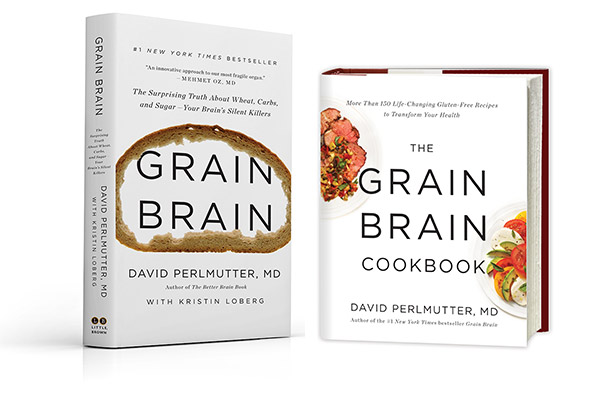
Is Going Gluten-Free Enough…or Should We Avoid All Carbs?
New York Times #1 best-selling author and board-certified neurologist David Perlmutter lays out groundbreaking evidence about how our dietary choices – and dependency on carbohydrates – are leading to an epidemic of brain disease.
The gluten-free diet – and who should follow it – is a hot topic of debate these days. While some people continue to adopt a gluten-free diet by choice – and often under the misguided notion that they’ll lose weight – many doctors do not necessarily recommend it without a diagnosis of celiac disease or gluten sensitivity.
Dr. David Perlmutter, author of the best-selling books Grain Brain and The Grain Brain Cookbook, argues that we should rethink the notion that a gluten-free diet is not for everyone. He proclaims, “Gluten is our generation’s tobacco,” and he lays out a compelling case for a strict gluten-free diet. In fact, he then goes a step further to recommend significant reduction of all carbohydrates.

So will we look back 5, 10, or 20 years from now, shaking our heads and wondering how we could eat these modern-day toxins?
After reading Grain Brain and speaking with Dr. Perlmutter, there was little doubt left in my own mind about the harm gluten can do to everyone … not just those with celiac disease. Dr. Perlmutter explains how humans have only been eating gluten for just 10,000 of our 2.6 million years on earth and are therefore not genetically equipped to digest it. It doesn’t help that the grains our ancestors ate 10,000 years ago bear little resemblance to the aggressively hybridized grains we eat now. He believes gluten represents “one of the greatest and most under-recognized health threats to humanity,” and that the link between gluten sensitivity and neurological dysfunction is strong.
In fact, neurological effects can be present even if there is seemingly no issue with gluten sensitivity in the gut. He demonstrates that gluten is potentially harming all of us to some degree, often without our knowledge. “The reality of the situation is that everybody has some degree of gluten sensitivity,” he said.
But gluten isn’t the only enemy. Dr. Perlmutter presents evidence that all grains and a high carbohydrate intake have contributed to diseases of the brain such as Alzheimer’s, Parkinson’s, dementia, ADHD, epilepsy, ALS, schizophrenia, and other psychiatric disorders. “This is supported by our most up-to-date, peer-reviewed mainstream science,” Dr. Perlmutter stressed.
For example, researchers are beginning to understand that insulin resistance, which is becoming increasingly common yet often goes undetected, sparks the formation of plaques present in the brains of people with Alzheimer’s. In fact, Alzheimer’s has been referred to as “Type 3 diabetes.”
But it doesn’t stop there. A diet high in carbohydrates leads to high blood fats, hypertension, and an accelerated rate of aging. Dr. Perlmutter cited a randomized trial of low-carbohydrate diets vs. low-fat diets detailed in a September 2014 article in The Annals of Internal Medicine. The low-carbohydrate diet was, in fact, found to be more effective for weight loss and cardiovascular risk factor reduction.
Dr. Perlmutter explains that carbohydrates and sugar cause inflammation, which can lead to these dreaded brain-related conditions. That’s because inflammation spreads through the body via the bloodstream, and chemicals are produced that are toxic to our cells. The end result is reduced cellular function and then cellular destruction.
Gluten and carbs are only one piece of the puzzle, however. Dietary cholesterol – currently lacking in most people’s diets due to campaigns to demonize eggs, meat, and other cholesterol-containing foods – is actually essential to the optimal functioning of the brain. The brain literally craves cholesterol, and dietary cholesterol actually reduces the body’s own production of cholesterol.
Dr. Perlmutter is quick to dispel any notion that his dietary recommendations entail loading up on things like bacon. His recommendations include healthy Mediterranean staples, just without the grains: olive oil, nuts, seeds, grass-fed beef, fish, poultry, above-ground low-starch vegetables, and pasture-raised eggs. It’s a diet that’s clean, fresh, and not overly complicated, but there are some nuances that are crucial to understand. His book goes into detail about recommended oils and fats – and which ones to avoid – as well as the best types of fruit to eat. But make no mistake, this is not a diet that involves any calorie counting. It’s more about what you eat than how much you eat.
Combined with other recommended lifestyle choices involving exercise and sleep, Dr. Perlmutter’s program will help keep your brain healthy and sharp well into your “golden years.” He explains that cognitive decline is not inevitable. “We are designed to be smart our entire lives,” he explains in his book. Best of all, it’s never too late to make these positive changes, and in fact, you’re likely to notice some fantastic benefits right away.
Within just a few weeks of following a low-carb lifestyle, you’ll likely notice a reduced incidence of headaches, depression, low energy levels, and foggy thinking. Dr. Perlmutter’s patients also find they sleep better, lose weight, are more creative and productive, have a sharper memory, and enjoy a better sex life.
I specifically asked Dr. Perlmutter about the benefits to children following his program, something he touches on in the book with regard to ADHD, autism, and hyperactivity.
“For many, health may not be the most important thing in life, but without it, nothing else matters. And when you have good health, pretty much anything is possible.”
– Dr. David Perlmutter,
Grain Brain
He affirmed that the dietary guidelines outlined in his book are appropriate for everyone, regardless of age. Certainly, if we retrain our children to eat in this way that’s most natural for our body, they will have a lower chance of suffering from the dreaded brain diseases too common with our and our parents’ generations.
After all, researchers are also learning that, while genetics may make us more susceptible to a particular brain disease, genes alone do not determine one’s destiny. It’s how our body responds to the foods we eat that can cause a gene to manifest itself or be suppressed. In other words, food regulates the expression of many of our genes.
For those of us who may have already done some damage from the dietary choices we’ve made, it was encouraging to read that it’s possible to literally reprogram your genes to how they were at birth, if you can limit your carb intake to what is absolutely necessary.
How do you do this? Dr. Perlmutter lays it all out toward the end of his book, detailing a 4-week plan of action to jumpstart a new, healthier lifestyle. He includes meal plans and recipes that are so tempting you won’t feel deprived, which is the key to sticking with any “diet.”
Even though there are 40 recipes included in Grain Brain, the success of the book – and this lifestyle – resulted in demand for more. The Grain Brain Cookbook, launched in September 2014, provides more guidance with 150 more mouth-watering recipes.
I’ve tried many of the recipes in both books myself, and what appeals to me is the focus on fresh, clean ingredients. The preparations are uncomplicated, and cooking any of the recipes with your kids is a great way to teach them healthy habits from a young age.
And isn’t that what this way of eating is really about? Breaking the cycle of destructive high-carb diets that have bombarded our generation? The message is that we have an opportunity to change things for the better not only with our children’s generation, but also with our own.
Learn more about Dr. Perlmutter and his program at www.drperlmutter.com.
 ABOUT THE AUTHOR:
ABOUT THE AUTHOR:
Karen Broussard publishes glutenfreetravelsite.com and the free DINE GLUTEN FREE mobile app. Both contain thousands of GF dining and travel reviews from around the world. Karen is also the publisher of the Gluten Free Travel Blog and two e-books available on Amazon: Gluten-Free in London and Gluten-Free in Italy.
As always, consult a medical professional before beginning any new protocol.




Pingback: Gluten Free Reuben Burger | Gluten Free Recipes | Simply Gluten Free
Pingback: Gluten-Free-Cold-Noodle-Salad | Recipes | Simply Gluten Free
Pingback: Gluten Free Zucchini Nut Bread Recipe | Simply Gluten Free
Pingback: Roasted Vegetable Spread & Flax Meal Crackers | Gluten Free Recipes
Pingback: Gluten Free Spinach and Ricotta Crepes | Gluten Free Recipes | Diet
Pingback: Gluten Free Sugar Free Cinnamon Apple Cupcakes | Gluten Free Recipes
Pingback: Gluten Free Miracle Souffles | Gluten Free Recipes | Gluten Free Diet
Pingback: Gluten Free Cheesy Cauliflower Tots
Pingback: Gluten Free Wild Mushroom and Quinoa Risotto | Recipes